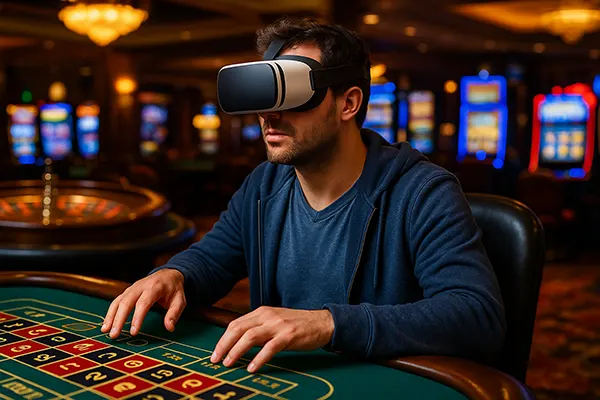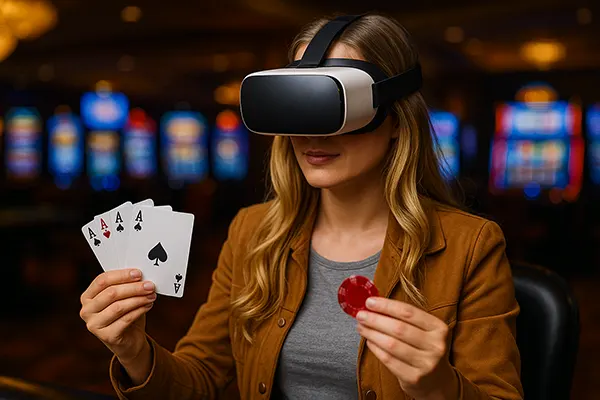The Impact of VR Technologies on Player Behaviour in Virtual Casinos

Virtual Reality (VR) has emerged as one of the most transformative technologies in the online gambling industry, offering players immersive experiences that blur the boundaries between digital environments and real-world casinos. In 2025, VR technology is not only enhancing visual and interactive elements but also influencing the psychology, habits, and decision-making patterns of players. This shift has brought both opportunities for entertainment and challenges for responsible gaming practices.
Enhanced Immersion and Engagement in VR Casinos
VR casinos now feature high-definition 3D environments, interactive avatars, and realistic soundscapes, creating a sense of presence that significantly increases player engagement. These environments mimic physical casino layouts, with virtual tables, slot machines, and social areas designed to replicate the atmosphere of traditional venues. Such realism leads to longer play sessions, as players are drawn into the interactive nature of the experience.
Advanced VR hardware, such as haptic feedback gloves and motion tracking, adds a tactile dimension to gameplay. Players can physically reach for cards, spin roulette wheels, or interact with other participants through realistic gestures. This interactivity fosters a stronger emotional connection to the game and can encourage repeat visits.
However, this heightened immersion also requires careful monitoring of player behaviour. The more engaging the environment, the greater the potential for extended play without breaks, which raises concerns regarding time management and responsible gambling awareness.
Psychological Influence and Behavioural Changes
VR environments can amplify the emotional impact of wins and losses, as the sensory detail and social interaction mimic real-life casino experiences. Players may feel stronger excitement during wins and more intense disappointment during losses, influencing risk-taking behaviour. This heightened emotional engagement can lead some users to make faster, less calculated decisions, particularly in high-stakes games.
Social dynamics within VR casinos also shape behaviour. Interacting with other players in real-time can encourage competitive play, peer influence, and collaborative gaming strategies. These interactions can be positive, fostering community, but may also contribute to impulsive betting if players are influenced by others’ risk levels.
From a psychological standpoint, the sense of “being there” can override rational decision-making processes. As a result, VR casino operators are now incorporating more visible reminders and in-game tools to help players maintain control over their activities.
Responsible Gambling Features in VR Casinos
With the immersive nature of VR gaming, responsible gambling tools have become more advanced and integrated. Players can now set time limits, betting caps, and receive visual or auditory alerts when they are approaching their personal thresholds. These features are designed to interrupt the flow just enough to encourage self-awareness without detracting from the entertainment value.
Some VR casinos have implemented real-time behavioural tracking systems that identify patterns associated with problem gambling. For example, repeated high-risk bets within a short timeframe or visible frustration in player movements may trigger automated prompts to take a break or review gameplay statistics.
These measures are supported by growing regulatory requirements. In jurisdictions such as the UK and parts of the EU, VR casino operators must provide transparent tools for self-exclusion, clear visibility of odds, and access to responsible gambling resources directly within the virtual environment.
Technological Solutions for Player Well-Being
Innovations in VR software now allow the inclusion of wellness features, such as virtual “cool-off” rooms where players can relax and interact in non-gambling environments. These areas offer light entertainment, educational resources about responsible play, and even mindfulness exercises aimed at reducing impulsivity.
Artificial intelligence plays a role in detecting signs of distress or risky behaviour in real-time. By analysing player activity, AI-driven systems can recommend breaks, adjust game difficulty, or present reminders about financial limits. These solutions are becoming more sophisticated in 2025, making them valuable tools for sustainable player engagement.
Additionally, partnerships between VR casino operators and mental health organisations are helping to ensure that players have access to professional support services. This integration of technology and care resources represents a significant step towards balancing innovation with user safety.

Future Trends and Ethical Considerations
As VR technology continues to evolve, its influence on player behaviour will likely become even more pronounced. The introduction of full-body tracking, enhanced AI-driven dealers, and personalised virtual environments may further increase engagement levels. These advancements, while exciting, raise questions about the ethical responsibility of operators to protect players from excessive use.
One emerging trend is the creation of hybrid VR gambling experiences that combine gaming with non-gambling entertainment. This approach aims to diversify player activity and reduce continuous high-risk betting, creating a healthier balance between fun and financial risk.
Regulatory bodies are also adapting, developing new guidelines specifically tailored to VR gambling environments. These include recommendations for transparency in game mechanics, data privacy protections, and the mandatory inclusion of well-being features to mitigate potential harm.
Balancing Innovation with Player Protection
The challenge for 2025 and beyond is finding a sustainable balance between technological advancement and player protection. VR offers unprecedented opportunities for creativity, personalisation, and engagement, but these must be aligned with ethical practices and robust safety measures.
Operators who prioritise player well-being alongside entertainment are likely to gain long-term trust and loyalty. This means embedding responsible gambling tools as standard, offering diverse gameplay options, and maintaining transparency in all aspects of the virtual experience.
Ultimately, the success of VR casinos will depend on how well they can merge cutting-edge technology with a commitment to safe, fair, and enjoyable gaming. This alignment is key to ensuring that the benefits of VR innovation do not come at the expense of player health and financial stability.





